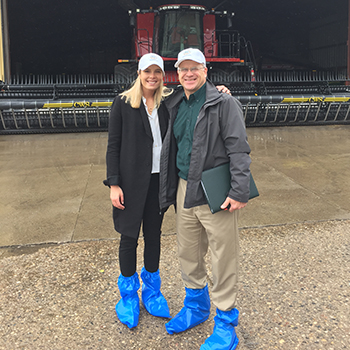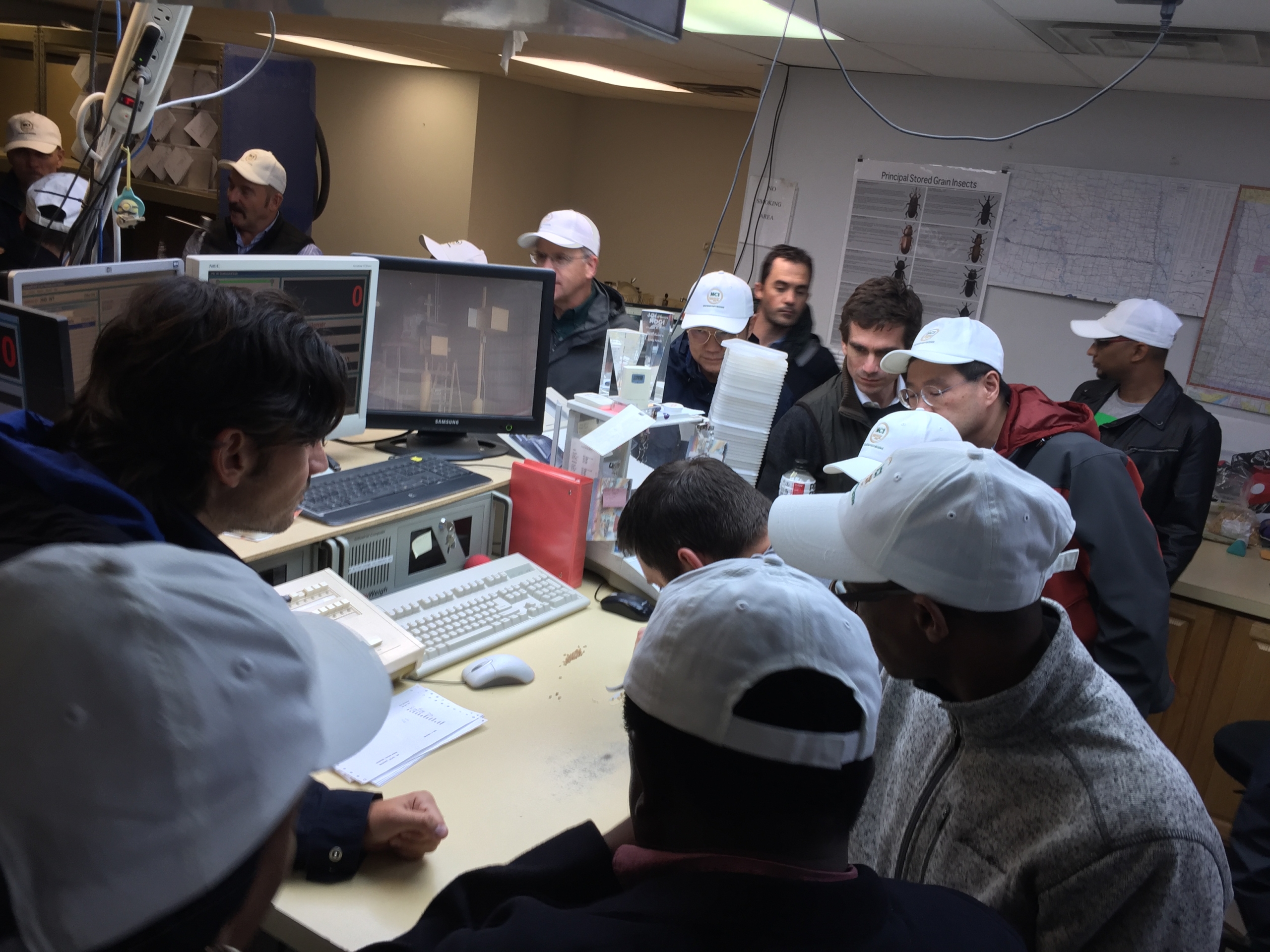USW Hosts Overseas Customers at Annual NCI Grain Procurement Course
By Claire Hutchins, USW Market Analyst
U.S. Wheat Associates (USW) believes customer engagement, supply chain transparency and accessible global market information are the building blocks for robust relationships with U.S. wheat customers. Every year, USW partners with the Northern Crops Institute (NCI) at North Dakota State University (NDSU) in Fargo, N.D., to offer NCI’s annual Grain Procurement Management for Importers Course.
This month, USW hosted 19 U.S. wheat customers including international procurement managers, supply chain managers, mill managers, wheat traders, agronomists and other industry executives at the eight-day course focused on the grain merchandising process. The course provided an overview of the U.S. grain handling and marketing system and the risk management tools available to help buyers purchase U.S. grains that meet their quality needs at the best value possible.
Daily lectures by industry experts and distinguished NDSU professors helped customers learn about cash and futures markets, risk management strategies, contracting for wheat value, USDA grain inspection services and U.S. and global supply and demand fundamentals. In addition to classroom lectures, course participants experienced the U.S. grain handling system through farm tours, country elevator visits, grain export facility tours and short seminars held at the Minneapolis Grain Exchange and various grain merchandising company offices in the Minneapolis, Minn., area

USW Market Analyst, Claire Hutchins, and NCI Programs Manager, Brian Sorenson tour a wheat farm in Casselton, N.D. after a day of NCI risk management courses at NDSU in Fargo, N.D.
Dr. Bill Wilson, NDSU professor of applied economics, presented on the U.S. grain transportation system, export basis, normal and inverted markets, pricing spreads and buyer decision timing, and alternative hedging strategies to help importers minimize price risk. Wilson emphasized the role USW’s weekly Price Report plays in price discovery to help buyers understand current U.S. wheat market conditions.
Dr. Frayne Olsen, NDSU professor of applied economics, led participants through a futures trading simulation in NDSU’s commodity trading lab, the largest in the world, which helped participants understand the fundamentals of standardized wheat trading through the U.S. futures markets. Through a futures buying exercise, he taught buyers how to minimize risk by identifying ideal buying opportunities in the futures market. Olsen also focused on the significance of fundamental analysis (supply and demand factors) in marketing decisions. He explained how to read USDA’s monthly Supply and Demand Report so importers better understand USDA surveying and statistical analysis in building each report.
Dr. David Bullock, NDSU associate research professor, lectured participants on basic hedging principals. This section helped buyers understand how to balance cash and futures positions while keeping risk at an acceptable level. He also instructed participants on options trading, which is another risk management tool ideal for importers.
Brandon Mortensen, BNSF market manager, educated participants on the intricacies of the U.S. rail transportation system. He emphasized the efficiency of the U.S. supply chain based on railroad investments in shuttle (110 to 120 cars) trains over the past few years. Mortensen explained that exports account for two thirds of all BNSF grain shipments and that BNSF works day in and day out with shippers to keep an effective system running to the benefit of U.S commodity importers.

NCI Grain Procurement Management for Importers Course participants watch elevator experts grade spring wheat according to USDA standards at a country elevator in Alton, N.D.
USW Vice President and West Coast Office Director Steve Wirsching educated participants on contracting for wheat value. He emphasized the need for buyers to have as much information as sellers when it comes to crop quality and supply so buyers can write import tenders to get the best end-use value. Wirsching encouraged buyers to communicate regularly with sellers and to build relationships with USW overseas staff.
Mike Krueger, an independent grain industry consultant, and Jim Peterson, North Dakota Wheat Commission policy and marketing director, discussed global and U.S. supply and demand factors affecting wheat prices. Peterson emphasized the difficult planting and harvesting conditions many U.S. producers faced during the 2019 growing season, especially in North Dakota, where much of the country’s spring wheat and durum is grown.
Participants also went on several tours during the course, including a CHS export facility in Superior, Wis. In a first for the NCI course, Ryan Caffrey, CHS senior durum merchant, took participants aboard a durum export vessel bound for Tunisia After the tour, representatives from USDA and the Duluth-Superior Seaway Port Authority educated participants on USDA wheat-grading practices and on the Duluth-Superior export system.

International wheat buyers tour outbound vessel at CHS export facility in Superior, Wisc. This ship will take approximately 11,000 metric tons (MT) of durum wheat to Tunisia.
Next, officials from the Minneapolis Grain Exchange (MGEX) shared the history of the exchange and current functions of the exchange in the U.S. and global marketplace. Frontier Futures broker Adam Knosalla talked about spring wheat buying opportunities, including the fact that MGEX spring wheat futures hit ten-year lows just a few weeks ago. Participants then travelled to Cargill headquarters to learn about its history, international contracts and arbitration. There was also a visit to CHS headquarters to learn about its grain merchandising practices.
NCI is a collaborative effort among North Dakota, South Dakota, Minnesota and Montana to support the promotion and market development of crops grown in this four-state region. It is an international meeting and learning center with a mission to support regional agriculture and value-added processing by conducting educational and technical programs that expand and maintain domestic and international markets for northern grown crops. USW and NCI believe strong relationships between customers and sellers of U.S. wheat build lasting, transparent relationships that last well into the future. NCI’s 36th annual Grain Procurement Management for Importers Course, and many like it in the future, will continue to build strong connections between U.S. exporters and international importers of U.S. wheat.
Header Photo Caption: USW Regional Program and Marketing Specialist Domenique Opperman; photo courtesy of Northern Crops Institute


